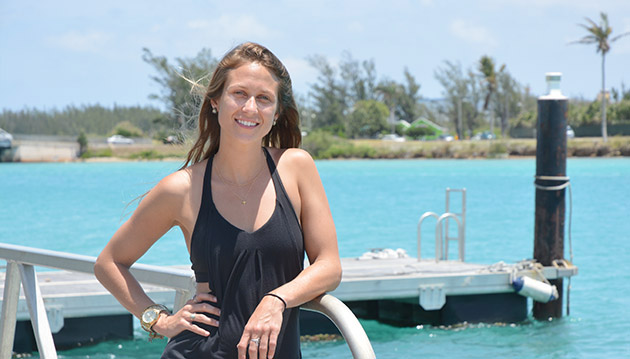A New Opportunity for a Familiar Face

In 2013, Amanda Alker—then a student at Florida Atlantic University—came to BIOS as part of the National Science Foundation’s (NSF) Research Experiences for Undergraduates (REU) program. This annual opportunity provides funding for undergraduate students to conduct supervised research at dozens of U.S.-based research institutes and universities. During her four months at BIOS, Alker investigated antibiotic resistance in bacteria associated with Bermuda’s largest sewage outfall.
Three years later, as a graduate student at San Diego State University, Alker applied to the NSF Graduate Research Fellowship Program, which supports students conducting research in several science, technology, engineering, and mathematics (STEM) disciplines as part of their Master’s or doctoral degrees. Her proposal, which received three years of funding through the program, outlined an investigation into the environmental cues that trigger the settlement of coral larvae from the water column onto various substrates. Uncovering what factors prompt this metamorphosis, as the larvae settle and transform from juvenile to adult, can play a key role in improving coral restoration efforts.
Alker, 24, is basing her investigation on recent research, conducted at San Diego State University by biologist Nick Shikuma, indicating that a specific strain of marine bacteria, combined with the virus-like particles it produces, is responsible for inducing similar metamorphoses in larvae of tubeworms, which are commonly found on coral reefs and intertidal zones. She plans to collect water samples from coral reefs in the Caribbean and Atlantic, including Bermuda, to determine the abundance and specificity of these virus-like particles. Alker also plans to collect coral larvae from each location and, in an experimental lab-based setup, expose the larvae to isolated samples of the particles in an attempt to induce metamorphosis.
Her funding begins this fall, which means Alker will spend the summer refining her experimental design and fostering the collaborations she needs for sample collection and laboratory analyses. As part of this preparation, she spent a week at BIOS in late May to discuss lab availability and sampling protocols with Gretchen Goodbody-Gringley and Samantha de Putron, two of the Institute’s coral ecology scientists.
You can hear more about Alker’s research in this YouTube video entitled “Beacon at Sea: a new way to help corals”
